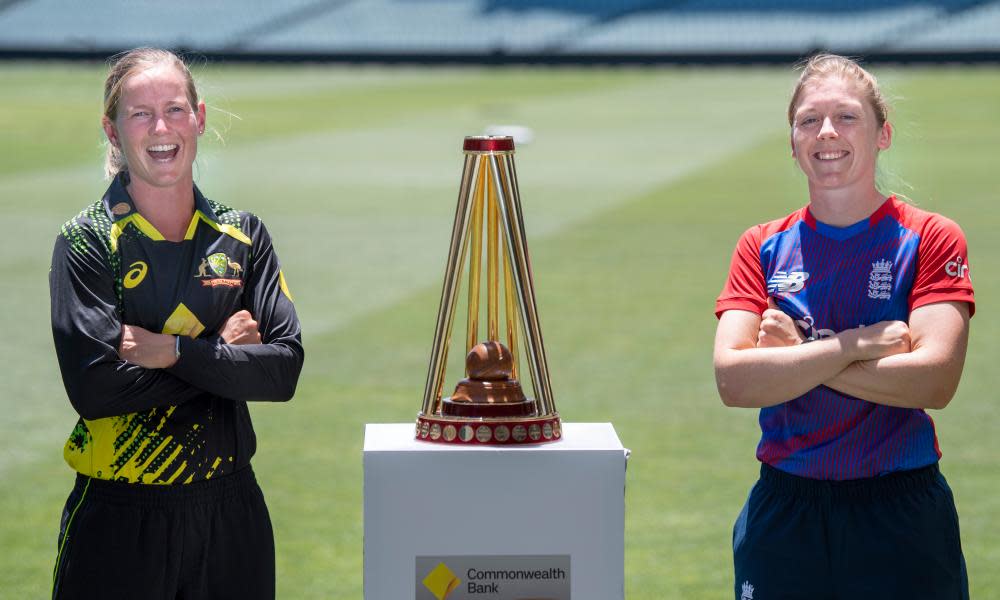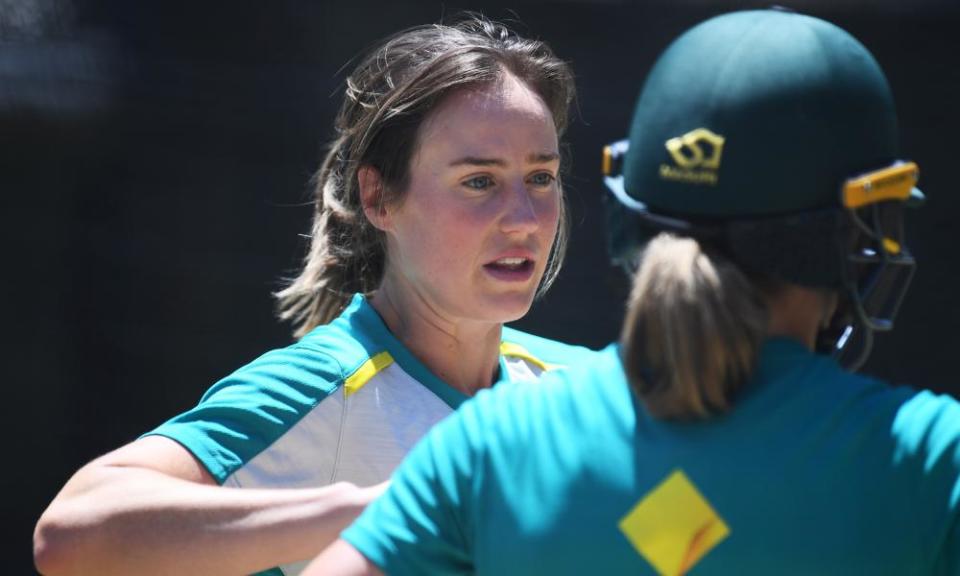England and Australia hit by off-field issues before Women’s Ashes series

The Blundstone Arena in Hobart recently provided the scene for English cricketing humiliation, but England Women have happier memories there. In January 2014, Charlotte Edwards hit 92 not out to inspire her team to a nine-wicket win in a T20 that was, in the new multi-format era, an Ashes-winning knock.
Edwards brushed tears from her eyes, lifted the trophy in triumph and England had a nice, deserved night out on the town to celebrate (and no police had to be called in to send them to bed, either).
Related: Heather Knight faces her toughest task as England try to regain Ashes | Raf Nicholson
For a while, Edwards was the heroine of the hour; but cricket is a fickle mistress. Eighteen months later she surrendered the Ashes to Meg Lanning’s Australia, losing the Canterbury Test by 161 runs, and the media called for her head. By May 2016 she had lost a World T20 semi-final to the old enemy; she paid for it dearly, robbed of the captaincy and her place in the England side.
As Joe Root knows only too well, England captains can have all the success in the world against other opponents but they will ultimately be judged by their record against Australia – an adage that equally applies in the context of the women’s game.
No England captain has won a Women’s Ashes series since Edwards triumphed at Hobart in 2014. Edwards’s successor, Heather Knight, is the latest to attempt the feat, in a series that begins on Thursday with three T20s, followed closely by a Test and three ODIs. Knight has won a World Cup, reached the final of another (2018), and was prevented from the chance to play in the final of yet another (2020) by inclement weather, but success against Australia has consistently eluded her.
Since she became captain in 2016, England have won just four out of 11 T20s against Australia – a win percentage of 36%. In ODIs, that percentage is even lower (two won out of seven played). England have managed to cling on for draws in the Ashes Tests they have played under Knight – at Sydney in 2017 and Taunton in 2019 – but Australia were dominant on both occasions. Perhaps it is frustration at this poor showing that has inspired Knight’s new approach of “trying to punch first and be aggressive … fighting fire with fire”.
Will it work? The signs are not good. “I wouldn’t say we’ve started that well, to be totally honest,” said the England coach, Lisa Keightley, on Monday, an early contender for understatement of the tour. First, the schedule was rejigged at the 11th hour due to Covid, with the T20s brought forward, rendering England’s focus on red-ball practice during their camp in Oman irrelevant to the first leg of the series and leaving them with 10 days to acclimatise after landing in Australia.
Then England’s first outdoor training session in Canberra was conducted in pouring rain. Finally, over the weekend, they played two warm-up T20 games against the England A side that has accompanied them. They lost both, despite Tammy Beaumont and Danni Wyatt being given two chances to bat in the second match.
“We’ve got to get the players hitting the ball well and bowling in good areas and sharpening up,” Keightley said. Not much to do in the next three days, then.
Admittedly, Australia’s own preparations have not been free from disruption. Several Women’s National Cricket League matches had to be called off due to the rapid spread of Omicron, leaving a number of their best players with little game-time since the WBBL ended in November. While Jess Jonassen (leg injury), Rachael Haynes (parental leave) and Megan Schutt (ditto) are returning to the side after extended periods of absence, the squad is far from full-strength.
Frontline bowlers Sophie Molineux and Georgia Wareham are sitting out with injuries and the decision to bring in Alana King as leg-spin cover instead of Amanda-Jade Wellington has raised eyebrows. Alyssa Healy is fighting her way back from an elbow injury and a catastrophic loss of form at the back end of WBBL.

The latest, most severe, blow occurred on Tuesday : news broke that Beth Mooney, Australia’s key in-form batter and leading WBBL run-scorer, sustained a fractured jaw during training and will have surgery. The Australian camp are suggesting she may still be fit by the end of the series, but that instinctively feels unlikely given the nature of the injury.
The perpetual threat of a Covid outbreak hangs over the series. ABoth sides have already been affected, despite severe restrictions in place on socialising: a member of the England support staff tested positive on Friday. Ellyse Perry’s arrival into Adelaide to join her teammates was also delayed by a Covid scare, though her positive PCR test was later found to have been the result of a previous, asymptomatic infection and she has been cleared to join the squad.
The challenge that Covid poses to the mental health of players should also not be overlooked. An Ashes series is always accompanied by extra scrutiny, but the intensity of this tour – which will immediately be followed by a 10-day quarantine in New Zealand before the World Cup – is bound to take its toll.
“What I’ve learned on this journey of Covid is that everyone’s bucket gets full at different times and you can’t pick it,” Keightley said. “You think one day they’re OK and you talk to them two days later and they’re not coping. It is a challenge supporting teams and being an athlete over the last 18 months.”
Perhaps more than ever before, the battle over the next few weeks will be being fought off the pitch, as well as on it.
• This is an extract from the Guardian’s weekly cricket email, The Spin. To subscribe and get the full edition, just visit this page and follow the instructions.

 Yahoo Movies
Yahoo Movies 
